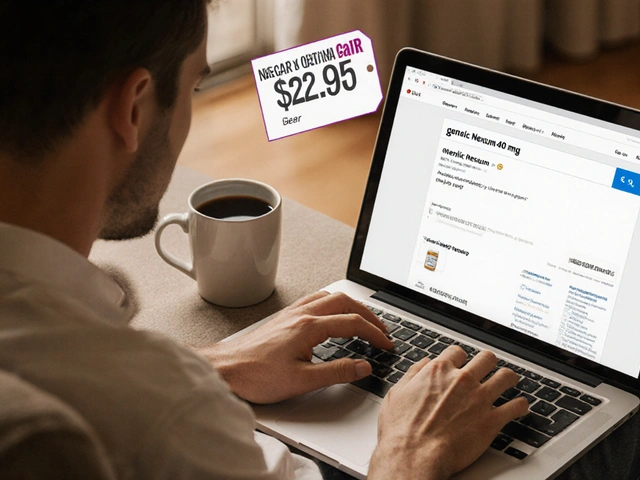Forgetting to take your meds isn’t just a minor slip-it can land you in the hospital. Around 50% of people with chronic conditions miss doses regularly, and for seniors taking four or more pills a day, it’s even worse. The CDC says medication non-adherence costs the U.S. healthcare system up to $300 billion a year. But here’s the good news: smart pill caps and dispensers are making it easier than ever to stay on track-without relying on memory alone.
Why Forgetfulness Is a Real Health Risk
It’s not laziness. It’s not carelessness. For many older adults, forgetting meds is a natural result of cognitive load. Imagine juggling eight different pills at different times of day, with varying instructions: “take with food,” “avoid caffeine,” “empty stomach.” Add in hearing loss, vision issues, or early-stage dementia, and even the most disciplined person can slip up.One study found that 89% of seniors over 65 take at least one prescription, and more than half take four or more. That’s a lot to remember. Missing a dose of blood pressure medicine? Risk of stroke goes up. Skipping antibiotics? Infection can come back stronger. Diabetes meds missed? Blood sugar spikes. These aren’t hypotheticals-they’re daily realities for millions.
That’s where smart pill technology steps in. Not just as a reminder, but as a safety net that works even when you’re distracted, tired, or confused.
How Smart Pill Caps Work (Without an App)
Not all smart pill devices need you to download an app, log in, or fiddle with settings. Some are designed to be invisible-literally. Take the Aidia Smart Bottle (formerly AdhereTech). It’s a cap that screws onto any standard prescription bottle. Inside, it has sensors that detect when you open it. If you open it at the right time, the cap glows blue. If you miss the window, it turns red. And if you don’t open it within an hour? You get a text, a call, or an alert to your caregiver-all without touching your phone.Then there’s Tenovi’s Cellular Pillbox. It doesn’t even look like tech. It’s a simple plastic box with compartments for morning, afternoon, evening, and night. When it’s time to take your pills, a red light turns on. When you open the right compartment, the light turns green. No app. No Wi-Fi. No passwords. Just light signals that even someone with dementia can follow. It runs on cellular signal, so it works anywhere-no router needed.
These aren’t gimmicks. A 2022 study in the Journal of Medical Systems showed patients using Aidia’s system had 92.3% adherence compared to just 67.8% for those without. That’s not a small bump. That’s life-changing.
Smart Dispensers That Actually Give You the Pills
Caps and boxes are great for reminders, but what if you forget to even open the container? That’s where automated dispensers come in.Hero Health’s automatic dispenser is one of the most trusted systems for seniors. It holds up to 28 doses. At the scheduled time, it beeps, flashes lights, and slowly rotates to reveal the correct compartment. If you don’t take the pills within 30 minutes? It repeats the alarm. And again. And again. One Reddit user shared that their mother’s adherence jumped from 60% to 98% after using it during a serious UTI. “The alarms literally saved her life,” they wrote.
It’s not just loud. It’s smart. The system can notify family members if a dose is missed. It even has a built-in emergency button that calls a pre-set number if pressed. And unlike cheaper models, it’s designed for people with hearing or vision loss-volume can be turned up, lights can be made brighter, and the interface is simple.
But there’s a catch. You have to refill it every week. That’s 15 minutes of work. For someone with arthritis or limited mobility, that’s a hurdle. So it’s not perfect-but it’s one of the most reliable options out there.

What’s the Difference Between Caps, Boxes, and Dispensers?
It’s easy to get overwhelmed by choices. Here’s a quick breakdown:| Device Type | How It Works | Cost (One-Time) | Monthly Fee | Best For |
|---|---|---|---|---|
| Aidia Smart Bottle (cap) | Screws onto pill bottle. Tracks openings. Sends alerts. | $149 | $39 | People who already use pill bottles |
| Tenovi Cellular Pillbox | Light signals. No app. Cellular-connected. | $199 | $29 | Seniors with memory issues, no tech comfort |
| Hero Health Dispenser | Automatically releases pills. Repeats alarms. | $499 | $0 | Complex regimens, high-risk patients |
| MedQ Electronic Dispenser | Repeats alarm every 30 minutes. Locked compartments. | $129-$249 | $0 | Dementia patients, overdose prevention |
Here’s what you should look for:
- If you’re already using pill organizers: go for a smart cap like Aidia.
- If you struggle with remembering to open the box: choose Tenovi’s light-based system.
- If you forget to even get to the pills: get Hero Health or MedQ.
- If cost is tight: MedQ is the cheapest, but lacks alerts to caregivers.
The Hidden Problem: Technology Can’t Force You to Swallow
Here’s the uncomfortable truth: no device can make you take the pill. It can remind you. It can even lock the compartment. But if you open it and then put the pills back? The system won’t know.On Reddit, one user admitted they’d “game” their Pill Connect system-opening the cap but not taking the meds. That’s a real flaw. These tools track access, not ingestion.
That’s why the best systems combine tech with human support. Aidia asks you to explain why you missed a dose: “Too busy?” “Side effects?” “Didn’t feel well?” That data goes to your doctor, who can adjust your meds or talk you through barriers.
And that’s the real power-not just the beep or the light, but the conversation it starts.
Cost, Coverage, and What Insurance Will Pay
Price is the biggest barrier. Most devices cost $150-$500 upfront, plus $20-$40 monthly fees. For many seniors on fixed incomes, that’s too much.But things are changing. In 2024, Medicare started covering smart adherence devices if they’ve been shown to reduce hospitalizations by 15% or more. Tenovi is already in UnitedHealthcare’s network. Hero Health is working with Medicare Advantage plans in several states.
Ask your pharmacist or care coordinator: “Is this device covered under my plan?” Some insurers will cover it as a “durable medical equipment” item if your doctor writes a letter of medical necessity. Don’t assume it’s not covered-ask.

What to Watch Out For
Not all smart pill devices are created equal. Here are red flags:- Devices that require Wi-Fi in homes with spotty internet-those will fail when you need them most.
- Apps that crash or need constant updates-seniors don’t have time for tech headaches.
- No backup power-if the power goes out and the device dies, you’re back to square one.
- Limited customer support-brands with only email support (like MedQ) often leave users stranded.
Look for:
- Cellular connectivity (not Wi-Fi)
- At least 30 days of battery life
- 24/7 phone support
- Easy-to-read screens and loud alarms
What’s Coming Next
The next wave of smart pill tech is even smarter. MIT’s AgeLab is testing edible sensors that send a signal when a pill is swallowed-no guessing. Hero Health is adding voice-activated emergency calls. AARDEX Group’s new AI system can predict when you’re likely to miss a dose before it happens-and nudge you in advance.But the real breakthrough isn’t the tech. It’s the shift from “reminders” to “support systems.” The best devices don’t just track your pills-they connect you to your care team, your family, and your health.
Final Thought: It’s Not About Technology. It’s About Safety.
Forgetfulness isn’t a personal failure. It’s a human problem. And we’ve built tools to solve it-not to replace care, but to support it.If you or a loved one is struggling to keep up with meds, start simple. A smart pill cap might be all you need. If the regimen is complex or the risk is high, a full dispenser could be life-saving.
Don’t wait for a hospital visit to realize you need help. The technology is here. The data proves it works. And now, more insurance plans are covering it than ever before.
Take the first step: talk to your pharmacist. Ask about smart pill options. Try one for a month. You might just find that the thing you thought was too complicated… is the thing that finally keeps you safe.
Do smart pill dispensers really work?
Yes-when used correctly. Studies show adherence rates jump from under 70% to over 90% with smart devices like Aidia and Hero Health. The key is matching the device to the user’s needs. A simple light-based system works better for someone with dementia than a complex app. The tech isn’t magic, but it’s proven.
Are smart pill caps covered by Medicare?
As of 2024, Medicare may cover smart pill devices if they’ve been shown to reduce hospitalizations by 15% or more. Devices like Tenovi and Hero Health are already being covered under some Medicare Advantage plans. You’ll need a doctor’s note stating medical necessity. Always ask your insurer or pharmacist-coverage is expanding fast.
What’s the cheapest smart pill dispenser?
The MedQ Electronic Programmable Pill Dispenser is the most affordable, ranging from $129 to $249 with no monthly fees. But it lacks remote alerts and cellular connectivity. It’s good for basic reminders but won’t notify family or doctors if a dose is missed. For better safety, invest in a cellular or app-connected system.
Can these devices help with dementia?
Absolutely. Locked dispensers like MedQ prevent overdosing, while light-based systems like Tenovi’s pillbox are designed for people who forget how to use apps. Hero Health’s repeating alarms and caregiver alerts make it ideal for advanced dementia. The goal isn’t independence-it’s safety. These devices give caregivers peace of mind and reduce the risk of dangerous errors.
What if I don’t want to use an app?
You don’t need one. Tenovi’s pillbox and Aidia’s smart cap work without apps. They use lights, sounds, and cellular alerts to communicate. You don’t have to touch a phone at all. In fact, many seniors prefer these because they’re simpler and more reliable than smartphone-based systems.
How long do the batteries last?
Battery life varies. Tenovi lasts up to 90 days on a single charge. Aidia lasts about 30 days. Hero Health’s dispenser runs on AC power but has a backup battery for outages. Always check the specs. For seniors in areas with frequent power cuts, choose a device with long battery life or backup power.
Can caregivers monitor usage remotely?
Yes-on most premium systems. Hero Health, Aidia, and Tenovi all send alerts to family members via text or email when a dose is missed. Some even allow caregivers to adjust schedules remotely. This is critical for people living alone. Don’t assume all devices offer this-check before buying.
What happens if the device breaks?
Reputable brands like Hero Health and Aidia offer replacement units and 24/7 support. Budget brands like MedQ often have slow, email-only support. Always check warranty terms and customer service ratings before buying. A device that breaks and can’t be fixed is worse than no device at all.










Danish dan iwan Adventure November 16, 2025
Smart caps are just glorified RFID tags with a Bluetooth leash. The real issue is pharmacokinetic non-adherence due to polypharmacy-induced cognitive fragmentation. You can’t sensor-solve a systemic healthcare failure.
Ankit Right-hand for this but 2 qty HK 21 November 17, 2025
USA spends $300B on meds but won’t fix the root cause? Pathetic. In India, we just use alarms on old Nokia phones. No subscription. No corporate surveillance. Real solutions don’t need monthly fees.
Daniel Stewart November 18, 2025
It’s fascinating how we pathologize forgetfulness as a personal failure, when in reality, it’s the natural consequence of an overburdened cognitive architecture. We ask elderly minds to manage complex temporal schedules designed by pharmacists who’ve never experienced aging.
The real innovation isn’t the device-it’s the humility to admit that human memory is finite, and that care shouldn’t be contingent on perfect recall.
Yet we keep building tools that assume competence, rather than designing systems that embrace frailty.
Latrisha M. November 19, 2025
My mom used the Tenovi pillbox for six months after her stroke. No app. No Wi-Fi. Just a light that turned green when it was time. She never learned to use her smartphone, but she knew that green meant ‘safe.’
It wasn’t perfect. Sometimes she’d open the wrong compartment. But the light stayed on until she got it right. No panic. No guilt. Just quiet, reliable help.
Ask your pharmacist about it. It’s not flashy, but it works.
John Mwalwala November 21, 2025
Wait… so these devices use cellular signals? That means they’re tracking your pill-taking habits… and sending data to who? Big Pharma? The government? Insurance companies? You think they’re helping you? They’re building behavioral profiles to adjust your premiums next year.
Hero Health? That’s a Trojan horse. One day, your device stops working because your ‘adherence score’ dropped. Next thing you know, your meds get denied. This isn’t safety-it’s surveillance with a beep.
And Medicare covering it? That’s just the first step. Soon, it’ll be mandatory. No device? No coverage. Welcome to the new healthcare dystopia.
Deepak Mishra November 23, 2025
OMG I JUST GOT MY HERO HEALTH BOX AND IT’S LIKE A ROBOT NANNY 😍😍😍 I WAS MISSING DOSES LEFT AND RIGHT AND NOW MY MOM GETS TEXTS WHEN I FORGET!! I EVEN GOT A CALL FROM MY DOCTOR BECAUSE I MISSED TWO!! 😭😭😭 BUT NOW I’M TAKING THEM EVERY TIME!!! IT’S CHANGED MY LIFE!!!
PS: THE ALARM IS SO LOUD I WOKE UP MY DOG AND HE’S NOW SLEEPING IN THE KITCHEN 😂
Rachel Wusowicz November 23, 2025
They say these devices are ‘life-saving’… but what if they’re just delaying the inevitable? What if the real solution isn’t more tech, but less pills? What if we stopped prescribing so many drugs in the first place? Who benefits from this $300B industry? Who profits when people are kept dependent on a box that blinks?
I’ve seen elderly patients on 12 meds… and all they needed was better nutrition, movement, and a quiet conversation with a doctor who actually listened.
This isn’t innovation. It’s industrialized dependency dressed in LED lights.
Diane Tomaszewski November 23, 2025
It’s not about the device. It’s about who’s holding your hand when you’re confused. My dad used a Hero Health box, but what made the difference was his neighbor bringing him soup every Tuesday and checking his pill tray. The box reminded him. The neighbor reminded him he wasn’t alone.
Technology helps. People heal.
Dan Angles November 24, 2025
While the technological advancements in medication adherence are commendable, one must not overlook the fundamental ethical imperative: the preservation of patient autonomy. The deployment of remote monitoring systems, however well-intentioned, introduces a potential for paternalistic oversight that may inadvertently erode the dignity of the elderly. The most effective intervention is not the one that compels compliance, but the one that empowers understanding. Therefore, while devices such as the Aidia Smart Cap and Tenovi Cellular Pillbox offer measurable utility, they must be integrated within a broader framework of patient-centered care, wherein education, empathetic communication, and individualized support remain paramount. The machine may remind; only the human can reason.